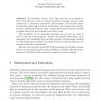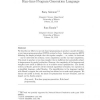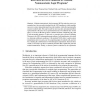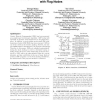1559 search results - page 110 / 312 » The Semantics of Future and Its Use in Program Optimizations |
ICFP
2006
ACM
15 years 10 months ago
2006
ACM
Monads are widely used in Haskell for modeling computational effects, but defining monads remains a daunting challenge. Since every part of a monad's definition depends on it...
FOSSACS
2008
Springer
14 years 11 months ago
2008
Springer
We introduce Erasure Pure Type Systems, an extension to Pure Type Systems with an erasure semantics centered around a type constructor indicating parametric polymorphism. The eras...
ENTCS
2006
14 years 10 months ago
2006
We describe our efforts to use rule-based programming to produce a model of Jumbo, a run-time program generation (RTPG) system for Java. Jumbo incorporates RTPG following the simp...
LPNMR
2009
Springer
15 years 4 months ago
2009
Springer
Modular nonmonotonic logic programs (MLPs) under the answer-set semantics have been recently introduced as an ASP formalism in which modules can receive context-dependent input fro...
GECCO
2008
Springer
14 years 11 months ago
2008
Springer
Genetic Network Programming (GNP) has been proposed as a graph-based evolutionary algorithm. GNP works well especially in dynamic environments due to its graph structures. In addi...




